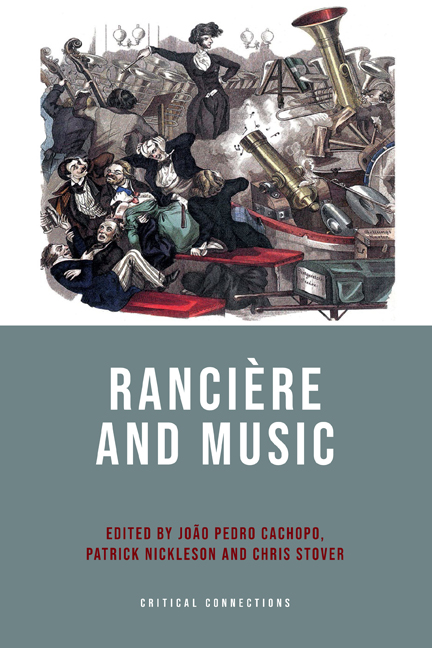Book contents
- Frontmatter
- Contents
- List of Examples
- Acknowledgements
- Notes on Contributors
- Introduction
- Part I: Music and Noise
- 1 Musique concrète and the Aesthetic Regime of Art
- 2 ‘Rip it up and start again’: Reconfigurations of the Audible under the Aesthetic Regime of the Arts
- 3 A Lesson in Low Music
- Part II: Politics of History
- 4 Wandering with Rancière: Sound and Structure under the Aesthetic Regime
- 5 Staging Music in the Aesthetic Regime of Art: Rancière, Berlioz and the Bells of Harold en Italie
- 6 Rancière on Music, Rancière’s Non-music
- 7 Coloured Opera and the Violence of Dis-identification
- Part III: Politics of Interaction
- 8 Musical Politics in the Cuban Police Order
- 9 Rancière and Improvisation: Reading Contingency in Music and Politics
- 10 Rancière’s Affective Impropriety
- Part IV: Encounters and Challenges
- 11 Rancière, Resistance and the Problem of Commemorative Art: Music Displacing Violence Displacing Music
- 12 Stain
- 13 On Shoemakers and Related Matters: Rancière and Badiou on Richard Wagner
- 14 Roll Over the Musical Boundaries: A Few Milestones for the Implementation of an Equal Method in Musicology
- Afterword
- A Distant Sound
- Works Cited
- Index
13 - On Shoemakers and Related Matters: Rancière and Badiou on Richard Wagner
Published online by Cambridge University Press: 03 October 2020
- Frontmatter
- Contents
- List of Examples
- Acknowledgements
- Notes on Contributors
- Introduction
- Part I: Music and Noise
- 1 Musique concrète and the Aesthetic Regime of Art
- 2 ‘Rip it up and start again’: Reconfigurations of the Audible under the Aesthetic Regime of the Arts
- 3 A Lesson in Low Music
- Part II: Politics of History
- 4 Wandering with Rancière: Sound and Structure under the Aesthetic Regime
- 5 Staging Music in the Aesthetic Regime of Art: Rancière, Berlioz and the Bells of Harold en Italie
- 6 Rancière on Music, Rancière’s Non-music
- 7 Coloured Opera and the Violence of Dis-identification
- Part III: Politics of Interaction
- 8 Musical Politics in the Cuban Police Order
- 9 Rancière and Improvisation: Reading Contingency in Music and Politics
- 10 Rancière’s Affective Impropriety
- Part IV: Encounters and Challenges
- 11 Rancière, Resistance and the Problem of Commemorative Art: Music Displacing Violence Displacing Music
- 12 Stain
- 13 On Shoemakers and Related Matters: Rancière and Badiou on Richard Wagner
- 14 Roll Over the Musical Boundaries: A Few Milestones for the Implementation of an Equal Method in Musicology
- Afterword
- A Distant Sound
- Works Cited
- Index
Summary
Jacques Rancière's The Philosopher and His Poor narrates the history of the separation between philosophy and artisans and workers. This separation is articulated paradoxically in philosophy’s endeavour to make time for the poor, while the poor are identified as those who, according to philosophy's judgement, do not have time for philosophy since they are allegedly consumed by work. Moreover, philosophy's assertion of a division of manual and intellectual labour is based on supposedly strictly separated, hierarchically structured natures codifying artisans (and workers) as simply lacking the capacity for philosophical reflection. This naturalisation of the division of labour proves to be a kind of internal exclusion of artisans through and in philosophy: an internal exclusion that serves not only as the condition of the possibility for pure philosophy, but at the same time as a restriction obliging artisans to a monotechnics, imbuing them with a capacity to do only one thing and to be only in one place, implying that artisans cannot and must not participate in other activities. Thus, artisans cannot and must not be anything else but artisans, and their identity as artisans bars them from participating in other practices of sensemaking such as philosophy or politics.
However, the utility of artisans consists not only in illustrating one of the lessons of philosophy, according to which one can do one and only one thing at a time, but also in complying with the necessity of differentiating philosophy from its doubles. This task is assigned not simply to the artisan in general, but rather to the ‘shoemaker’ who, according to Rancière, ‘is the generic name for the man who is not where he ought to be if the order of estates is to get on with the order of discourse’. The shoemaker serves thus as what is at stake for, and the supplement of, a position that is supposed to guarantee that the philosopher can be strictly distinguished from the sophist, the poet and the artist.
- Type
- Chapter
- Information
- Ranciere and Music , pp. 312 - 333Publisher: Edinburgh University PressPrint publication year: 2020



